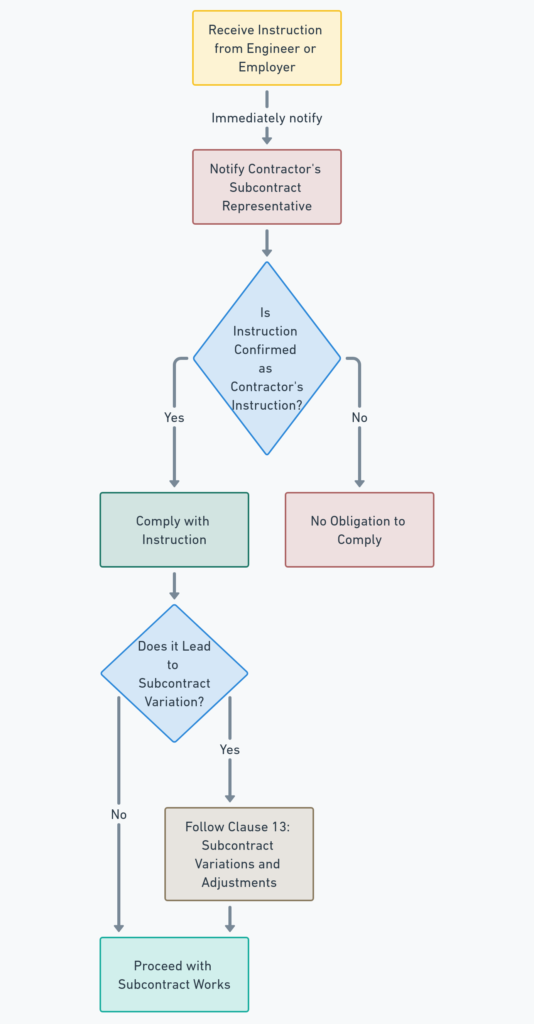![]()
Overview
Clause 2.3 in the FIDIC Yellow Book—Conditions of Subcontract for Plant and Design-Build (2019)—sets out how a Subcontractor must respond to instructions and determinations originating under the Main Contract (MC), and clarifies the chain of communication through the Contractor’s Subcontract Representative.
Key Components & Definitions
Compliance with Engineer’s Instructions
The Subcontractor is required to comply with all Engineer’s instructions and determinations notified as a Contractor’s Instruction, even if their validity under the MC is later questioned.
The clause mandates that the Subcontractor must “comply with all instructions and determinations of the Engineer which are notified to him as a Contractor’s Instruction, irrespective of whether the instructions and determinations were validly given under the Main Contract.”
Subject to Sub-Clause 3.1 [Contractor’s Instructions]
Compliance sits under Sub-Clause 3.1: the Subcontractor takes instructions only from the Contractor’s Subcontract Representative, who has authority mirroring MC 3.3 (Engineer’s instructions).
The Subcontractor shall take instructions only from the Contractor’s Subcontract Representative who shall have the authority in relation to the Subcontract Works to give instructions as the Engineer has under Main Contract Clause 3.3. The Subcontractor shall comply with all instructions, given or confirmed in writing, of the Contractor’s Subcontract Representative on any matter related to the Subcontract. Any such instruction is effective only if given or confirmed in writing and expressly states it is issued under this Sub-Clause.
Direct Instructions from Employer or Engineer
Core rule (Clause 2.3)
The Subcontractor must comply with Engineer’s determinations/instructions that are notified as a Contractor’s Instruction, subject to Sub-Clause 3.1.
The Subcontractor shall, in relation to the Subcontract Works, comply with all instructions and determinations of the Engineer which are notified to him as a Contractor’s Instruction, irrespective of whether the instructions and determinations were validly given under the Main Contract. This obligation shall be subject to Sub-Clause 3.1 [Contractor’s Instructions].
What if the Employer/Engineer instructs you directly?
- Immediate notification: Inform the Contractor’s Subcontract Representative at once and share the written instruction if you have it.
- No obligation until confirmed: You need not comply until the direction is confirmed in writing as a Contractor’s Instruction.
- If it changes the work: treat as a potential Subcontract Variation and follow Clause 13 procedures.
If the Subcontractor receives any direct instruction from the Employer or the Engineer, he shall immediately inform the Contractor’s Subcontract Representative and supply him with a copy if given in writing. He has no obligation to comply unless and until it has been confirmed in writing as a Contractor’s Instruction.
Variations hook — Clause 13
If the direction amounts to a Subcontract Variation, apply Clause 13 [Subcontract Variations and Adjustments] for price and time adjustments, notices, and records.
Interactions with Other Clauses
Clause 13 [Subcontract Variations and Adjustments]
When an instruction leads to a Subcontract Variation, the procedures for valuation and adjustment of the Subcontract Price are governed by Clauses 13.1 to 13.3.
13.1 — Variation of Subcontract Works
When an instruction constitutes a variation, the Subcontractor must execute the work as per the Contractor’s Instruction. If the Subcontractor believes the variation affects safety, suitability, or guarantees (points (i)–(iii) in 13.1), they must promptly give notice to the Contractor.
13.2 — Valuation of Subcontract Variations
Challenges may arise in agreeing valuation. If agreement isn’t reached, “the Contractor shall make a fair decision” considering all relevant circumstances.
Clause 13.2 provides that if agreement on valuation is not reached, the Contractor shall make a fair decision considering all relevant circumstances.
13.3 — Adjustments
Once valuation is settled (agreement or fair decision), adjust the Subcontract Price and (where applicable) the schedule in accordance with the Subcontract procedures.
Main Contract Clause 3.3 — Instructions of the Engineer
Referenced in Sub-Clause 3.1, MC 3.3 frames the Engineer’s authority, which the Contractor’s Subcontract Representative mirrors for the Subcontract Works. By adhering to this chain, the Subcontractor stays compliant and avoids unauthorized scope/cost changes.
Challenges & Solutions
Direct Instructions from Employer or Engineer
Challenge: Subcontractors may inadvertently act on direct instructions from the Employer/Engineer without proper authorization, causing breaches or unapproved variations.
Solution: Implement a strict internal protocol: immediately report any direct instruction to the Contractor’s Subcontract Representative, attach the written instruction (if any), and seek confirmation as a Contractor’s Instruction before acting. Train staff on the communication chain.
Validity of Instructions
Challenge: Determining whether an instruction is valid under the Main Contract can be complex and disputed.
Solution: Focus on the Subcontract obligation: comply with instructions notified as Contractor’s Instructions under Clause 2.3. This places validation with the Contractor and keeps the Subcontractor within contractual scope.
Subcontract Variations & Adjustments
Challenge: Unclear variation handling leads to pricing/scheduling disputes.
Solution: Follow Clause 13 procedures end-to-end: prompt notices, valuation under 13.2, and timely agreement/decision. Engage early with the Contractor to settle adjustments.
Best Practices
- Effective Communication: Maintain open lines with the Contractor’s Subcontract Representative to clarify instructions and implications promptly.
- Documentation: Keep meticulous records of all instructions, notices, and communications to aid compliance and dispute resolution.
- Understand Hierarchies: Follow the chain of command to avoid unauthorized work or scope drift.
- Legal & Regulatory Compliance: Ensure actions comply with contractual requirements and applicable standards, codes, and environmental laws.

